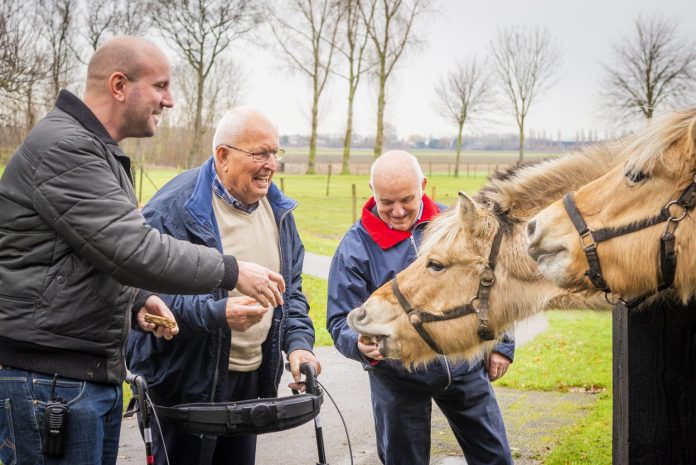An immense amount of research effort is going into preventing and curing dementia, so far with little to show for millions spent.
An alternative approach is to seek ways to improve the lives of the thousands of people who are living with the condition.
Boerderij Op Aarde (Farm On Earth) is one of hundreds of Dutch care farms. For the past 10 years, it has offered meaningful day care in the Netherlands to elderly people who live at home and suffer from dementia.
It’s an approach that holds many benefits for people with dementia, who are often less physically active and more isolated.
Care farms promote movement and social interaction and give participants a sense of purpose.
Ronald van de Vliet and Arjan Monteny are the farmers of Op Aarde.
They write: “Elderly people with psycho-geriatric complaints (dementia) can come to us five days a week for day care.
“The peace, space and regularity provide structure to the day. Because the participants contribute meaningfully in and around the farm, they can continue to live independently for longer. It also provides respite for caregivers.
Participants start every weekday morning discussing the day’s work. There’s no shortage of tasks: goats and pigs need feeding, gardens need tending, hot lunches need to be prepared and old furniture might need to be repainted.
“We take care of the animals together and collect the eggs. The animals play an important role in the daily activities of the care participants, on which the animals have a beneficial effect.
“At noon we always have a hot meal. We prepare the meal together with fresh vegetables from our garden.”
Monteny says the workers get to choose which duties they’ll take on. He says that’s important, because people with dementia don’t have many opportunities to make decisions in their lives.
Elizabeth Hewitt, writing in the US newsletter Reasons to be Cheerful reported that four days a week, 81-year-old Paula Oranje gets up and goes off to work on Op Aarde care farm near Rotterdam.
Depending on the day, she might feed the chickens, assist with chores, or help prepare hot lunches.
The farm resembles a typical Dutch working farm in many ways, but with one key difference: Paula and most of her fellow farm workers have dementia.
Paula’s son, Kees Oranje, says that before his mother started coming to Op Aarde in 2018, she was isolated, living alone in the family’s farmhouse.
She seemed to bounce back after she started at the farm when she was 77. He believes part of what makes her days fulfilling is that they involve activities that inspire a range of emotional responses: frustration, joy, surprise, even anger.
“What the person needs is not only care, they need emotions, too,” he says.
Tasmanian-based mental health expert Liz Everard said at the moment only one care farm is operating in Australia – Careship Coorong – a social care farm in South Australia for people living with dementia or people with other social care needs.
“There are lots of opportunities for care farms in Australia, where there is all-year round activities. This might include indoor activities such as pottery during the hot summer months.
“Clear evidence is emerging from the 400 or so care farms in the Netherlands for people living with dementia that care farms are improving the social and cognitive functions of the participants,” she said.
































